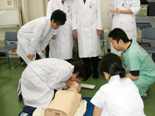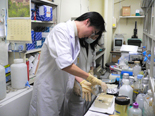
New Approaches
1. Medical Introductory Course |
||||||||||||||||||||||||||||||||
This course begins immediately after the students are admitted to YMDU. The course is designed forthe students to learn about various aspects of medical service which is not limited to the job of a clinician or a researcher and broaden their options for the future careers. Through this introductory course, the students develop their awareness as a medical student and cultivate communicative proficiency and problem-solving skills which are required for their future professions. |
 |
|||||||||||||||||||||||||||||||
|
||||||||||||||||||||||||||||||||
In the second semester of the fourth year, the students fully engage in research activities, taking up to six months. The students are expected to foster their spirit of academic inquiry, which will help them become a clinician with scientific views. The students may plan their projects in the field they are most interested in and carry out their research not only at laboratories of TMDU but also other associated academic institutions, including Imperial College London, Tokyo Institute of Technology,
|
 |
|||||||||||||||||||||||||||||||
|
||||||||||||||||||||||||||||||||
| The problem-based learning approach has been introduced in medical education at TMDU. The students participate in small-group learning which enables them to understand basic medical concept by discussion and investigation in a group with advice from a tutor where appropriate. |
||||||||||||||||||||||||||||||||
|
||||||||||||||||||||||||||||||||
An integrative learning approach has been adopted in some courses at TMDU. Instead of lectures on separate subjects, some courses are organized around a disease group such as "Digestive Diseases". The timetable below is the outline of a typical week for the integrated curriculum:
|
||||||||||||||||||||||||||||||||
[back] |
||||||||||||||||||||||||||||||||
5. Clinical Clerkship |
||||||||||||||||||||||||||||||||
TMDU has implemented major reforms in its clinical training program. In its innovative clinical clerkship, the students can have an active clinical experience as a member of the medical staff. The program runs for 18 months and is divided into three parts: intensive preparation, on-site observation, and clinical skills training. In the intensive preparation course, emphasis is placed on the students' understanding of the skills of history taking, physical examination and clinical reasoning for differential diagnosis. For the second part of the program, the students engage in on-site observation at various medical settings including private clinics and general hospitals. TMDU offers this type of on-site training as it is difficult to experience after graduation. Through the third phase of the program, the students are involved in patient care as active members of the medical team. The students have rotations of twelve weeks of internal medicine, eight weeks of surgery, four weeks of emergency medicine, and twelve weeks of electives. The students can take Harvard Medical School Externships as electives. During the in-patient service, the students attend and take part in all the care a patient undergoes from admission to discharge. The educational facilities make use of modern equipment. While taking a clinical clerkship, all students are equipped with a personal handy phone for communication within the university hospital. Electric medical chart systems are also available. As a surgical clerk, the students practice surgical procedures using animal organs so that they can learn skills not as an observer, but as an operator. This is one of the innovative approaches TMDU has introduced for the students' clinical training.
|
||||||||||||||||||||||||||||||||
6. Professional Development Course |
||||||||||||||||||||||||||||||||
|
This new longitudinal course was newly introduced in 2005. This course runs for six years and help the students form the idea of professionalism as medical service worker medical scientist. This course is designed to encourage the students to deepen their understanding of the medical profession and its accompanying responsibilities while they gain knowledge and skills. |
||||||||||||||||||||||||||||||||
|
[back] |
||||||||||||||||||||||||||||||||